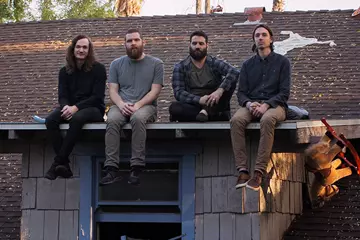Back when I was in year 8 (when I was fourteen) I used to go down to my local newsagent store and buy copies of Metal Hammer magazine. It used to cost about 20 dollars a pop and it was always at least two months out of date. But I didn’t care one bit. It covered all of my favourite bands at the time, and most importantly, it got me listening to a lot smaller bands from all over the world. Metal Hammer would feature these bands in short write-ups in the magazine and it always made me want to check them out. This, in turn, led to me discovering bands like Your Demise, Rise To Remain and a hell of a lot of other great bands. Most importantly, however, this lead to my discovering of a band that would completely change my life.
Architects.
I don’t recall exactly how they came to my attention at first. It was either a feature article or perhaps even an advertisement. Regardless of what the initial spark was, I remember thinking that that was a really cool band name and that I’d have to see what they were like. A short time later, I found one of their music videos on YouTube, ‘Early Grave’. As soon as that song started, my jaw just hit the floor. It was the lowest tuned guitar I had ever heard at that point, (bear in mind that Slipknot was the heaviest band I’d heard at that ripe young age) and it had some seriously impressive drumming to it. Sure, it had a big melodic hook towards the end, but the rest of it was just flat out intensity and aggression. From that point on, I was well and truly hooked on Architects. After hearing 'Early Grave', I knew that I had found something that I truly loved and something that I wanted to share with everyone.
Quite honestly, I think there is just so much to love about Architects. There’s the technicality for the musicians out there, huge breakdowns for the punters who just love to get in the pit, and even some terrific sing-along sections and melodic choruses for your girlfriend that you’ve dragged along to their show. It's such a great blend of elements and sounds that it's clear to see why Architects have stuck with it since the 'Daybreaker' era.
Lyrically, vocalist Sam Carter has touched on so many different topics over the years, ranging from humanity and how we’re killing our planet because of our never-ending greed; on religion having too great of a bearing in our world and our direction as a species; and even world events such as the 2011 London Riots (of which 'Devil's Island' is about). Lyrical content aside, for myself as a budding young guitarist, it was all about the guitar riffs, and the man we have to thank for the band's terrific guitar work was Thomas Searle.
Don't miss a beat with our FREE daily newsletter
Tom and his twin brother Dan Searle (drummer) started Architects with a vastly different line-up in the early 2000s as young teenagers. I’ve often believed that those two are the key ingredient to the band's sound and the reason that they are as strong as they are. Tom was well known for being the band’s chief songwriter, and that certainly speaks volumes when you look at the varying styles across their discography. From their mathcore, Dillinger Escape Plan-meets-Converge inspired beginnings of ‘Ruin’ and ‘Nightmares’, the divisive and melodically-focused ‘The Here And Now’, and the almost back to basics banger ‘Lost Together/Lost Forever’; we all saw what Tom was capable of doing.
Hell, if you place newer songs like ‘Naysayer’ or ‘These Colours Don’t Run’ alongside slightly older tunes like ‘Heartburn’ or ‘An Open Letter To Myself’, you’d be forgiven for thinking they were written by two different bands entirely. But that was the range of Tom’s songwriting ability within the framework of Architects.
Of course, when I heard that on the 20th of August that Tom had passed away, I was truly shocked. Many fans knew that he had skin cancer treatment in 2013 and missed shows because of it, but it was assumed that he had fully recovered. Sadly, however, it seemed that the cancer had spread to a degree where even Tom knew that time was not on his side. Don’t think for a second that it stopped him from working as hard as he possibly could! Aside from writing and recording a new album, he had the strength to play two shows with his band when he was at his weakest. As doctors had advised him that there wasn’t much they could do for him, he signed himself out of hospital and went to Germany to play with his band mates. That takes a huge amount of mental drive and a lot of courage considering his situation, and it shows a man who continually loved his job, his band, and his music, even in the face of death.
In retrospect, all of this has made me look at many of the lyrics the band's latest record, ‘All Our Gods Have Abandoned Us’, in a new light. When I first heard the album, I will admit that it didn’t immediately grab me in the way that 'Lost Forever/Lost Together' had. But one thing I noticed was that it was definitely darker from a lyrical standpoint, but nothing seemed amiss. After all, Architects weren't always known for their cherry, upbeat lyrics. It’s only now that I see Tom had composed some of the songs with lyrics that were reflective of a man that knew he would not be alive in the near future, and that he had come to terms with what was going to happen.
For example, take the album’s closing track ‘Memento Mori’, which plainly states:
“When the veil lifts, how will I know? Will I see god?”
Or even in ‘Gone With The Wind’:
“I'm always gone with the wind. Crawling in and out of my mind. God knows, I lost all my faith. A sickness with no remedy, except the ones inside of me. You ever wonder how deep you can sink into nothing at all?”
Tom's death has made me look at 'All Our Gods Have Abandoned Us', and to some extent 'Lost Forever/Lost Together', in a different light altogether.
Beyond all of that, like most fans and people within the heavy music industry, Tom’s death affected me greatly. His guitar playing showed me that it was very well possible to write heavy, technical guitar riffs but also retain a great sense of melody, and have the ability to write much more stripped back songs. He made me realise that a guitar could be used in so many different ways in heavy music, more so than what I had initially thought possible. His playing showed me that even something as simple as tuning differently to most other bands could have a drastic effect on how you sounded, how you composed riffs, and how you played your instrument. Even little things like that the gear he used had a significant influence on what I used in my own writing and bands. To say that he was one of my musical heroes because of his unique approach would be a severe understatement.
As briefly as I can put it – thank you, Tom. Your music completely and utterly changed my life and for that, I can never be grateful enough. I’m just glad that you got to show so many of us your immense talents in your short time with us. Again, thank you. You will be sorely missed.
If you would like to make a donation to The Martlets, the hospice where Tom received his care, you can do so here.
















